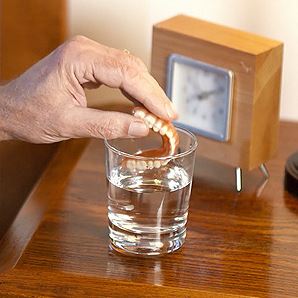Proper oral care is important for everyone, even for seniors who may have lost their teeth and are using dentures. In fact, proper care of the mouth is especially important for seniors with dentures.

This is because if dentures don’t fit properly in the mouth, it may cause friction that in turn cause sores. If proper oral hygiene is not observed, these sores may easily get infected, causing more complications. It will also be harder for the elderly to eat and speak.
For the elderly, denture problems may also mean their confidence to smile and even be around other people will be reduced. They may also develop unhealthy eating habits, weight loss, nutrition deficiencies, and other problems.
How to Avoid Denture Problems
1. It gets some getting used to. If you have new dentures, you have to give yourself time to get used to them. It is natural to feel uncomfortable at first, and in fact, your dentures may require adjusting ever so often in the beginning.
2. Be open for adjustments. If you get sores on your gums and tongue, chances are, your dentures are not fitted properly. This is why you have to visit your dentist for an adjustment.
3. Drink nutrition-packed shakes. As you adjust to your new dentures, you may have a hard time eating. So, for the meantime, you may drink nutrition shakes to fill your nutritional needs.
4. Be kind to yourself. Don’t forget to give yourself a break. You may remove your denture for at least 4 hours a day. Usually, people leave their dentures off when they sleep. At this time, be sure to store yours in a denture solution or water so that it will hold its shape.
5. Pay attention to your weight. Losing or gaining weight may impact the fit of your denture. If you notice significant weight changes, or if your denture start to feel different, schedule an appointment with your dentist to see if an adjustment is in order.
6. Use denture cream. Denture creams work, as long as you use them properly. They help seal the denture and keep it in place. However, don’t try to use a denture cream to try to make an ill-fitting denture to stay in place.
7. Schedule regular dental visits. As always, visiting your dentist regularly allows your dentist to look at your dentures and see if there are problems or if there are adjustments that need to be made. It also helps the dentist spot any problem and solve them before things get worse.
8. Observe good oral hygiene. Of course, nothing beats maintaining a good oral hygiene. Remember to brush your teeth and gums well, including your dentures. Brush your dentures properly and regularly, preferable after eating, to remove bacteria and food particles that may get trapped in the crevices of the dentures.
Recent Comments